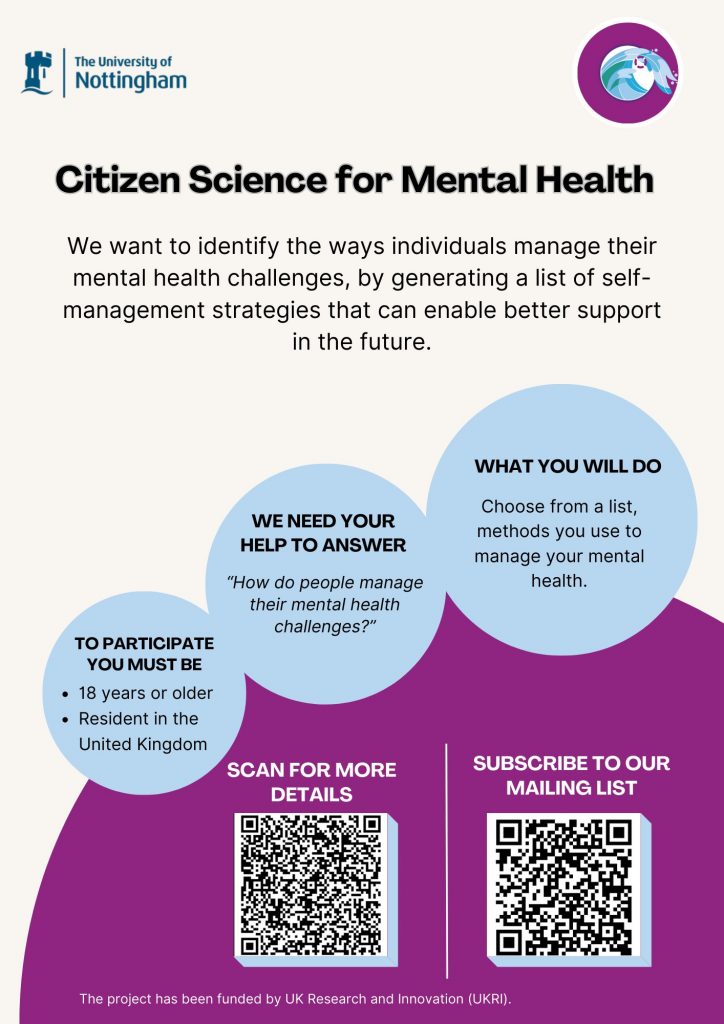Citizen science may be outlined as ‘public engagement in scientific analysis actions the place residents actively contribute to science both with their mental effort, surrounding information, or their instruments and sources’ (Socientize Consortium, 2013). Citizen science subsequently promotes widespread public engagement throughout numerous essential phases of the analysis cycle, encompassing conceptualisation, information assortment, information translation, and analysis (Katapally, 2019; Silvertown, 2009). Nonetheless, while this system has gained reputation within the sciences, there may be little steerage on learn how to use this method inside the discipline of psychological well being analysis.
Todowede and colleagues (2023) subsequently performed a scientific evaluation to:
- Examine the views of researchers and citizen science contributors relating to using citizen science initiatives in psychological well being in relation to the ten ideas of greatest follow tips for the appliance of citizen science (Robinson et al., 2018)
- Establish the moral and authorized points arising from citizen science approaches in psychological well being analysis
- Combine the findings to develop greatest follow tips for future citizen science initiatives in psychological well being

Citizen science is the involvement of enormous public populations in analysis, together with on the levels of knowledge assortment and information translation.
Strategies
This evaluation used a complete search technique spanning each peer-reviewed educational literature and gray literature. A number of sources have been searched together with multi-disciplinary educational databases, web sites and blogs, convention proceedings, particular person journal searches and quotation monitoring.
Inclusion standards have been paperwork reporting on:
- Citizen science as a analysis method to have interaction public contributors in any type of psychological health-related analysis;
- Citizen science research that engaged psychological well being stakeholders, particularly individuals with lived expertise of psychological well being points;
- The expertise of conducting or collaborating in a citizen science undertaking that’s associated to psychological well being;
- The usage of citizen science approaches to gather information utilizing any type of examine design.
Paperwork have been excluded in the event that they reported on:
- The usage of different predefined participatory analysis strategies (e.g., co-design, coproduction or surveys and interviews to contain outlined neighborhood or examine members);
- Research utilizing citizen science that weren’t focussed on psychological well being.
Screening and information extraction have been performed by at the least two authors. A top quality evaluation of included articles was not carried out, as a result of inclusion of a broad vary of doc sorts which rendered conventional high quality evaluation instruments infeasible.
A deductive thematic evaluation was carried out utilizing the ten European citizen science affiliation ideas (Robinson et al., 2018) as an preliminary framework.
Consistent with citizen science frameworks, the evaluation crew included a combination of researchers and non-scientist representatives, together with some people with lived expertise of psychological well being issues or psychological well being misery.
Outcomes
This evaluation incorporates 9 articles throughout numerous examine designs, all carried out in high-income nations. Aside from the scientific inhabitants, there was no discernible development relating to the members concerned in citizen science. Moreover, not one of the research included within the evaluation adhered to any reporting tips.
- Involvement: Residents have been mostly concerned as contributors offering or gathering information or finishing duties for the analysis undertaking.
- Real science end result: All included initiatives achieved the purpose of a real scientific end result; 6 out of 9 research used citizen science to analyze major psychological well being analysis.
- Advantages: Each citizen {and professional} scientists recognised a number of advantages. Citizen scientists noticed enhancements in empowerment, info, social assist, private enjoyment, psychological well being, and high quality of life, whereas professionals famous its inclusive and environment friendly analysis method, echoing the perceived advantages for citizen scientists.
- Levels of participation: Most citizen scientists participated in information assortment and evaluation of knowledge collected by skilled scientists. A number of research concerned citizen scientists within the creation of the examine and dissemination of outcomes.
- Suggestions: Most research didn’t report any side of suggestions.
- Analysis method: The included research recognised the constraints of citizen science, together with biases in activity directions affecting outcomes, unpredictable participant engagement and the necessity for high quality relationships supporting psychological well being. Challenges included distressing messages posted by members, requiring devoted platform moderation.
- Information availability: Not one of the included research reported public availability of their information, and seven/9 research have been revealed in an open entry journal.
- Acknowledgement: Simply over half of the included research acknowledged their citizen scientists by thanking them for his or her participation as an unspecified group (e.g., not by identify).
- Analysis: All research within the evaluation generated a scientific output. Information high quality was achieved by numerous participation and project-specific coaching in addition to methods to forestall information contamination between participant teams. Excessive dropout charges of citizen scientists have been reported. Obstacles to engagement included time constraints and commitments, technical challenges and private elements.
- Moral and authorized points: Three moral points have been recognized: safety, private info and safeguarding points. Two research reported having obtained moral approval previous to graduation of the analysis, and three reported acquiring knowledgeable consent from citizen scientists.

Each citizen {and professional} scientists recognised the advantages of citizen science, which included enhancements in psychological well being and high quality of life.
Conclusions
It’s telling that this systematic evaluation solely managed to determine 9 eligible research. Regardless of this evaluation discovering clear advantages of citizen science, there may be extra that may be carried out to encourage it’s use inside psychological well being analysis.

Few research have been included on this evaluation; we have to do extra to encourage the inclusion of fine high quality citizen science inside psychological well being analysis.
Strengths and limitations
The authors ought to be recommended for his or her inclusion of a assorted and numerous analysis crew, encompassing each citizen {and professional} scientists, and particularly together with lived expertise of psychological well being. Given the qualitative nature of this proof synthesis, it could have been good to see a reflexivity assertion to discover how these numerous traits could have impacted on the way in which wherein information was skilled or interpreted.
The authors also needs to be recommended for his or her rigour in conduct of this evaluation. The search technique is impressively complete, and nice care has been taken at every stage to guarantee rigour. Transparently reporting this course of additionally acknowledges the importance of open science.
While clear causes got for not performing a top quality evaluation, it’s a disgrace that that is lacking from this essential evaluation. On condition that the data from included research was used to create greatest follow tips (see Implications for follow), it could be good to know what the standard of the proof was that has been used to tell these.

This evaluation is rigorously performed, although suffers from a scarcity of high quality evaluation which makes it troublesome to find out how dependable the findings are.
Implications for follow
The authors use their qualitative synthesis to create greatest follow tips for conducting and reporting psychological well being citizen science analysis. Constructing upon the ten European citizen science affiliation ideas, the authors give extra info relating to psychological health-specific concerns:
1. Involvement
- Citizen scientists ought to embrace individuals with lived expertise of psychological well being points in roles reminiscent of contributor, collaborator, and undertaking chief.
2. Real science end result
- Contain key stakeholders to make sure that analysis results in change.
3. Advantages
- Establish deliberate advantages from the outset.
- For citizen scientists, participation shouldn’t be the norm, although extra energetic roles ought to be reimbursed.
4. Levels of participation
- Participation in any respect levels of the undertaking ought to be inspired by researchers.
5. Suggestions
- Plan and build-in a co-developed suggestions method from the begin to inform citizen scientists about: a) key findings, and b) use of findings.
6. Analysis method
- Consideration ought to be given to safeguarding points to guard individuals with lived expertise of psychological well being.
7. Public information availability
- Early co-creation of a knowledge administration plan with contributors is essential.
- Guarantee information safety laws and related native info governance insurance policies are adopted.
- Open-access publication is the norm.
8. Acknowledgement
- Any presentation of findings ought to acknowledge: i) all contributing citizen scientists as an unnamed group, ii) with their permission, particular person named contributors, and iii) with their permission, named consultant teams.
9. Analysis
- This could cowl scientific outputs, information high quality, participant expertise, researcher expertise and wider society/coverage impression.
10. Authorized and moral
- If no private info is collected, there isn’t a must acquire knowledgeable consent.
- The place private info is collected, you will need to acquire knowledgeable consent.
- Know-how safety and anonymisation ought to be addressed.
- A set of IP addresses or moderation of contributions ought to be specific.
- Debriefing and coaching ought to be supplied.
If you’re a budding citizen scientist and also you’re eager to get entangled in psychological well being analysis, take a look at this examine based mostly on the College of Nottingham:

Citizen Science for Psychological Well being. Click here to find out more.
Assertion of pursuits
No competing pursuits.
Hyperlinks
Major paper
Todowede, O., Lewandowski, F., Kotera, Y., Ashmore, A., Rennick-Egglestone, S., Boyd, D., … & Slade, M. (2023). Best practice guidelines for citizen science in mental health research: systematic review and evidence synthesis. Frontiers in Psychiatry, 14.
Different references
Katapally, T. R. (2019). The SMART framework: Integration of citizen science, community-based participatory research, and systems science for population health science in the digital age. JMIR mHealth and uHealth, 7(8), e14056.
Robinson, L. D., Cawthray, J. L., West, S. E., Bonn, A., & Ansine, J. (2018). Ten principles of citizen science. In S. Hecker, M. Haklay, A. Bowser, Z. Makuch, J. Vogel, & A. Bonn (Eds.), Citizen Science: Innovation in Open Science, Society and Coverage. UCL Press (pp. 27-40).
Silvertown, J. (2009). A brand new daybreak for citizen science. Trends in Ecology & Evolution, 24(9), 467-471.
Socientize Consortium (2013). Citizen science for Europe. Towards a better Society of Empowered Citizens and Enhanced Research. Zaragoza, Spain: SOCIENTIZE Consortium.

